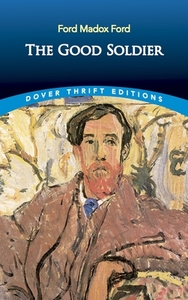Take a photo of a barcode or cover
This superb novel requires re-reading. Will do that someday.
really enjoyed this one, not at all what i expected from the title. refreshing first person usage, really interesting form, love how scandalous it is compared to all the victorian novels i've been reading haha. modernism gives
The post-mortem of a good-on-paper marriage that much later turned out to be even less than the little the narrator thought of it. The crux of his questioning of the marriage really is, "If for nine years I have possessed a goodly apple that is rotten at the core and discover its rottenness only in nine years and six months less four days, isn't it true to say that for nine years I possessed a goodly apple?" Is it possible for something to be bad if you don't know it? Where does the bad lie? Is it something empirical? Does it have to be measured in order to exist? Or is it a property of something waiting to be discovered and measured?
This book really describes fully the needs of a person to be acknowledged and the consequences of acknowledging the fullness of another. The non-affair that kills Edward really only hurts him because he acknowledges something that had probably been building for a while, but harmlessly while it went unnoticed. Acknowledgement is really the driving force behind the novel, both in the positive and negative aspects. The impetus of the narrator's story is his final acceptance of what his marriage really was, an acknowledgement of his wife's true nature. But at the same time that he is criticizing his wife for her shortcomings, he is illustrating his own and acknowledging them. He sees that he allowed himself to be deceived and so was a party in his deception. The question that comes to me is would he have been happier without the knowledge? Would I be happier if I didn't have the knowledge, being in his place? Do we need to know or do we want to know? And why? Is it just to punish ourselves, show ourselves how little we really matter? Is the thirst for acknowledgement a way to verify our own existence or a way to embitter it?
"We are all so afraid, we are all so alone, we all so need from the outside the assurance of our own worthiness to exist."
This book really describes fully the needs of a person to be acknowledged and the consequences of acknowledging the fullness of another. The non-affair that kills Edward really only hurts him because he acknowledges something that had probably been building for a while, but harmlessly while it went unnoticed. Acknowledgement is really the driving force behind the novel, both in the positive and negative aspects. The impetus of the narrator's story is his final acceptance of what his marriage really was, an acknowledgement of his wife's true nature. But at the same time that he is criticizing his wife for her shortcomings, he is illustrating his own and acknowledging them. He sees that he allowed himself to be deceived and so was a party in his deception. The question that comes to me is would he have been happier without the knowledge? Would I be happier if I didn't have the knowledge, being in his place? Do we need to know or do we want to know? And why? Is it just to punish ourselves, show ourselves how little we really matter? Is the thirst for acknowledgement a way to verify our own existence or a way to embitter it?
"We are all so afraid, we are all so alone, we all so need from the outside the assurance of our own worthiness to exist."
challenging
dark
mysterious
sad
adventurous
challenging
funny
informative
mysterious
tense
slow-paced
Plot or Character Driven:
Plot
Strong character development:
No
Loveable characters:
No
Diverse cast of characters:
No
Flaws of characters a main focus:
Complicated
Pretty depressing view of humanity, and not my cup of tea at this time in my life.
Is it possible to want to throw a book across the room, curse the author, and then give it five stars?
I couldn’t finish the book. I got to page 10 and returned it. I felt that they were trying too hard in the introduction to explain things to me.




